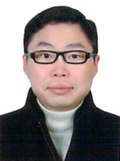MEMBER:Yang WANG
 |
Yang WANG | Postdoctoral Research Fellow |
| Affiliation: | Michinobu Laboratory Department of Materials Science and Engineering Institute of Science Tokyo S8-711-2-12-1 Ookayama, Meguro-ku, Tokyo 152-8552, Japan |
|
| Tel&Fax: | +81-3-5734-2469 | |
| E-mail: | wang.y.av[at]m.titech.ac.jp ([at]=@) | |
| ResearcherID: | F-4187-2017 | |
| ORCID ID: | orcid.org/0000-0002-0611-3669 |
Education
| 2015.4-2017.3 | Ph.D. in Department of Organic and Polymeric Materials, Tokyo Institute of Technology, Tokyo, Japan |
| 2013.10-2015.3 | M.E. in Department of Organic and Polymeric Materials, Tokyo Institute of Technology, Tokyo, Japan |
| 2010.9-2013.6 | M.S. in University of Chinese Academy of Sciences (UCAS) and Ningbo Institute of Materials Technology and Engineering, Chinese Academy of Sciences (CAS), Ningbo, China |
| 2006.9-2010.6 | B.E. in Northwestern Polytechnical University (NWPU), Xi’ an, China |
Career
| 2017.4- | Postdoctoral Research Fellow in Department of Materials Science and Engineering, Tokyo Institute of Technology, Tokyo, Japan |
Self-introduction
Yang WANG was born in Shaoxing, Zhejiang Province, People’s Republic of China in 1987. He obtained his bachelor and M.S. degree from Northwestern Polytechnical University and University of Chinese Academy of Sciences, in 2010 and 2013, respectively. Supported by the Japanese Government (MEXT Scholarship), he then moved to Tokyo Institute of Technology and earned his Master and Ph.D. degree under the supervision of Prof. Tsuyoshi Michinobu in 2017. During the doctor course, he worked for three months as a visiting research associate under the supervision of Prof. Kazuo Takimiya at RIKEN. Currently, he works as a postdoctoral research fellow in the Department of Materials Science and Engineering at Tokyo Institute of Technology. His research is focusing on the design and synthesis of n-type conjugated polymers for non-fullerene organic solar cells, n-channel organic thin film transistors and organic thermoelectric applications. His research interests also include the synthesis of small molecules, organic/inorganic hybrid materials, and related optoelectronic devices.
Photos

Awards and Honors
| 2017 | The 2016 Chinese Government Award for Outstanding Self-financed Student Abroad, the Embassy of People’s Republic of China in Japan, Tokyo, Japan |
| 2013-2017 | Japanese government MEXT (Monbukagakusho) full scholarship (up to 5-year stipend with a tuition waiver), Tokyo, Japan |
| 2013 | "Xuchuang" Polymeric Materials Scholarship, Ningbo Institute of Materials Technology and Engineering, Chinese Academy of Sciences (CAS), Ningbo |
| 2010-2011 | Outstanding Graduate Student Scholarship in Chinese Academy of Sciences (CAS), Beijing |
| 2008-2009 | Excellent Student Fellowship (First Prize) in Northwestern Polytechnical University, Xi’ an
|
Representative publications
- Rational Design of High-Mobility Semicrystalline Conjugated Polymers with Tunable Charge Polarity: Beyond Benzobisthiadiazole-Based Polymers
Y. Wang, T. Hasegawa, H. Matsumoto, T. Mori, T. Michinobu
Adv. Funct. Mater. 27, 1604608 (2017) [Inside Back Cover] - Naphthodithiophenediimide-Benzobisthiadiazole-Based Polymers: Versatile n-Type Materials for Field-Effect Transistors and Thermoelectric Devices
Y. Wang, M. Nakano, T. Michinobu, Y. Kiyota, T. Mori, K. Takimiya
Macromolecules 50, 857-864 (2017) - Benzothiadiazole and Its π-Extended, Heteroannulated Derivatives: Useful Acceptor Building Blocks for High-Performance Donor-Acceptor Polymers in Organic Electronics
Y. Wang, T. Michinobu
J. Mater. Chem. C 4, 6200-6214 (2016) [Back Cover] - Benzobisthiadiazole-Based Conjugated Donor-Acceptor Polymers for Organic Thin Film Transistors: Effects of π-Conjugated Bridges on Ambipolar Transport
Y. Wang, T. Kadoya, L. Wang, T. Hayakawa, M. Tokita, T. Mori, T. Michinobu
J. Mater. Chem. C 3, 1196-1207 (2015) [Inside Back Cover] - New Semiconducting Polymers Based on Benzobisthiadiazole Analogues: Tuning of Charge Polarity in Thin Film Transistors via Heteroatom Substitution
Y. Wang, H. Masunaga, T. Hikima, H. Matsumoto, T. Mori, T. Michinobu
Macromolecules 48, 4012-4023 (2015)
